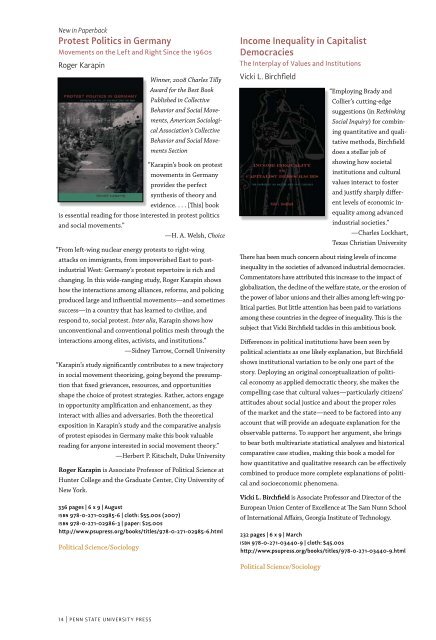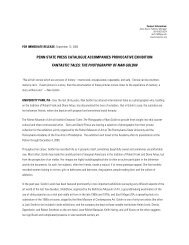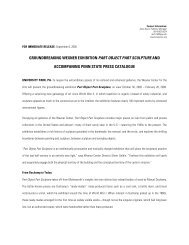penn state university press - Pennsylvania State University Press
penn state university press - Pennsylvania State University Press
penn state university press - Pennsylvania State University Press
Create successful ePaper yourself
Turn your PDF publications into a flip-book with our unique Google optimized e-Paper software.
New in Paperback<br />
Protest Politics in Germany<br />
Movements on the Left and Right Since the 1960s<br />
Roger Karapin<br />
Winner, 2008 Charles Tilly<br />
Award for the Best Book<br />
Published in Collective<br />
Behavior and Social Movements,<br />
American Sociological<br />
Association’s Collective<br />
Behavior and Social Movements<br />
Section<br />
“Karapin’s book on protest<br />
movements in Germany<br />
provides the perfect<br />
synthesis of theory and<br />
evidence. . . . [This] book<br />
is essential reading for those interested in protest politics<br />
and social movements.”<br />
<br />
—H. A. Welsh, Choice<br />
“From left-wing nuclear energy protests to right-wing<br />
attacks on immigrants, from impoverished East to postindustrial<br />
West: Germany’s protest repertoire is rich and<br />
changing. In this wide-ranging study, Roger Karapin shows<br />
how the interactions among alliances, reforms, and policing<br />
produced large and influential movements—and sometimes<br />
success—in a country that has learned to civilize, and<br />
respond to, social protest. Inter alia, Karapin shows how<br />
unconventional and conventional politics mesh through the<br />
interactions among elites, activists, and institutions.”<br />
—Sidney Tarrow, Cornell <strong>University</strong><br />
“Karapin’s study significantly contributes to a new trajectory<br />
in social movement theorizing, going beyond the presumption<br />
that fixed grievances, resources, and opportunities<br />
shape the choice of protest strategies. Rather, actors engage<br />
in opportunity amplification and enhancement, as they<br />
interact with allies and adversaries. Both the theoretical<br />
exposition in Karapin’s study and the comparative analysis<br />
of protest episodes in Germany make this book valuable<br />
reading for anyone interested in social movement theory.”<br />
<br />
—Herbert P. Kitschelt, Duke <strong>University</strong><br />
Roger Karapin is Associate Professor of Political Science at<br />
Hunter College and the Graduate Center, City <strong>University</strong> of<br />
New York.<br />
336 pages | 6 x 9 | August<br />
isbn 978-0-271-02985-6 | cloth: $55.00s (2007)<br />
isbn 978-0-271-02986-3 | paper: $25.00s<br />
http://www.psu<strong>press</strong>.org/books/titles/978-0-271-02985-6.html<br />
Political Science/Sociology<br />
Income Inequality in Capitalist<br />
Democracies<br />
The Interplay of Values and Institutions<br />
Vicki L. Birchfield<br />
<br />
<br />
“Employing Brady and<br />
Collier’s cutting-edge<br />
suggestions (in Rethinking<br />
Social Inquiry) for combining<br />
quantitative and qualitative<br />
methods, Birchfield<br />
does a stellar job of<br />
showing how societal<br />
institutions and cultural<br />
values interact to foster<br />
and justify sharply different<br />
levels of economic inequality<br />
among advanced<br />
industrial societies.”<br />
—Charles Lockhart,<br />
Texas Christian <strong>University</strong><br />
There has been much concern about rising levels of income<br />
inequality in the societies of advanced industrial democracies.<br />
Commentators have attributed this increase to the impact of<br />
globalization, the decline of the welfare <strong>state</strong>, or the erosion of<br />
the power of labor unions and their allies among left-wing political<br />
parties. But little attention has been paid to variations<br />
among these countries in the degree of inequality. This is the<br />
subject that Vicki Birchfield tackles in this ambitious book.<br />
Differences in political institutions have been seen by<br />
political scientists as one likely explanation, but Birchfield<br />
shows institutional variation to be only one part of the<br />
story. Deploying an original conceptualization of political<br />
economy as applied democratic theory, she makes the<br />
compelling case that cultural values—particularly citizens’<br />
attitudes about social justice and about the proper roles<br />
of the market and the <strong>state</strong>—need to be factored into any<br />
account that will provide an adequate explanation for the<br />
observable patterns. To support her argument, she brings<br />
to bear both multivariate statistical analyses and historical<br />
comparative case studies, making this book a model for<br />
how quantitative and qualitative research can be effectively<br />
combined to produce more complete explanations of political<br />
and socioeconomic phenomena.<br />
Vicki L. Birchfield is Associate Professor and Director of the<br />
European Union Center of Excellence at The Sam Nunn School<br />
of International Affairs, Georgia Institute of Technology.<br />
232 pages | 6 x 9 | March<br />
isbn 978-0-271-03440-9 | cloth: $45.00s<br />
http://www.psu<strong>press</strong>.org/books/titles/978-0-271-03440-9.html<br />
Political Science/Sociology<br />
14 | <strong>penn</strong> <strong>state</strong> <strong>university</strong> <strong>press</strong>
















